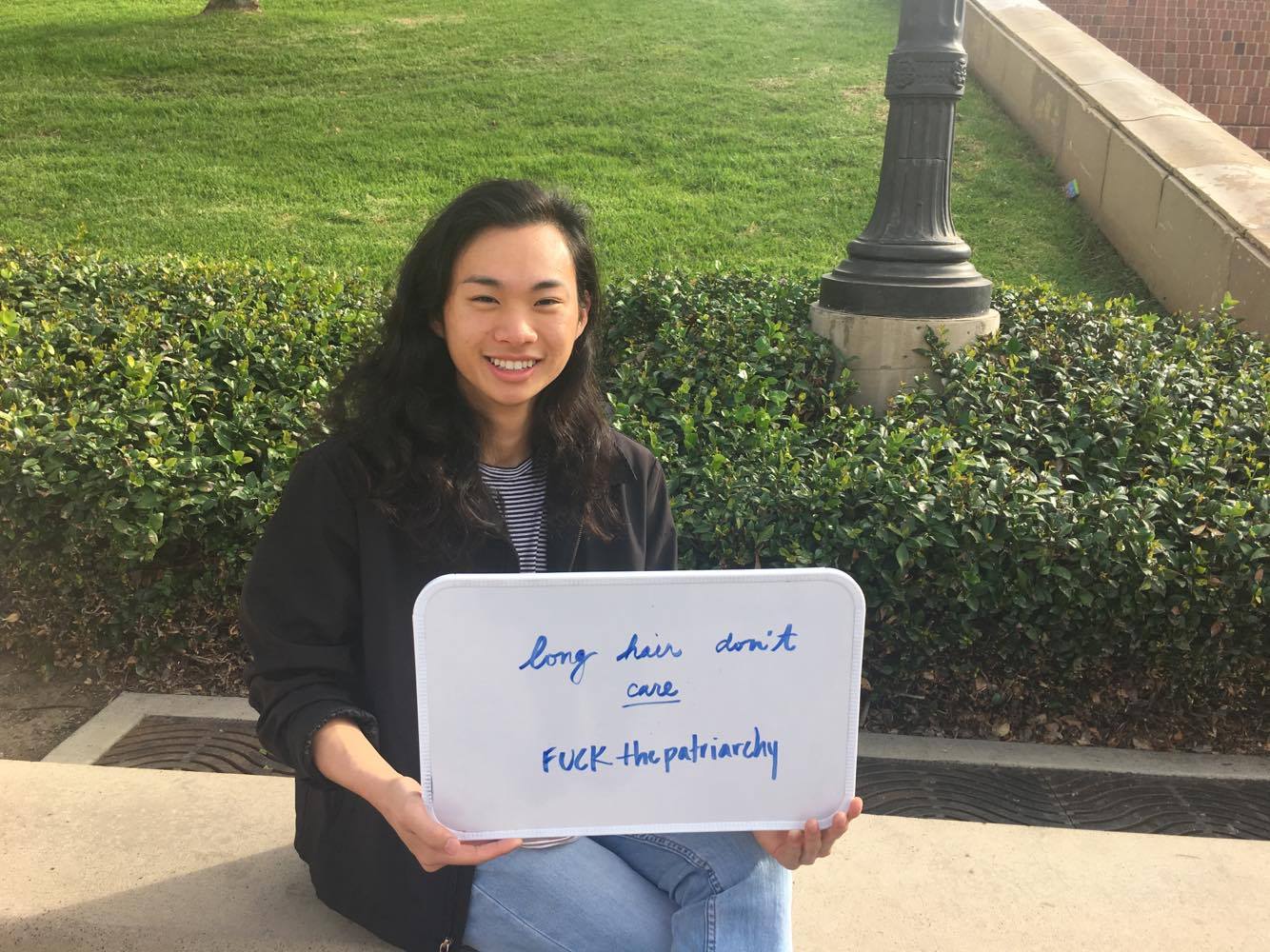Featured UCLA Feminist: Calvin Ma

Photo by Natalie Delpino
Calvin is a fourth-year student majoring in sociology and minoring in education studies who has very little patience for “anything that annoys him,” which includes unchecked male privilege, gender policing, heteronormativity, and the reinforcement of archaic gender roles. Calvin believes society needs intersectional feminism to solve these problems.
“Feminism is a movement in this contemporary period fighting for gender equality…[and includes the] community of queer folk,” Calvin stated, explaining the need to include the experiences of trans, bi, and lesbian women in the movement. “They have a very distinct identities,” and those identities must be acknowledged and incorporated in the feminist movement. When asked if his experiences as a man has influenced his view of feminism, he took a moment before replying, “That’s hard because I don’t consider myself a man.”
Calvin explained, “Man evokes too much of an image of a really masculine individual. And I don’t feel like I portray that. So I don’t really like to consider myself a man….I always refer myself as a male…A gay male.” As a gay male, Calvin has always felt he wasn’t welcomed by the patriarchy. He feels his sexuality and more feminine personality has resulted in him being discriminated and alienated by straight, masculine cis-men. However, Calvin acknowledges that he does benefit from male privilege.
Growing up in a traditional household, Calvin was raised with strict gender roles: the women in his family did all the housework and the men were considered head of the household. Calvin’s lack of masculinity worried his family, who told him that he needed to be friends with other men in order to become more masculine. At an early age, he rejected these strict gender rules, stating, “All my life I always thought that we, both women and men should have equal rights, equal opportunity. Equal everything.” Due to his misconception of feminism as female domination and as women trying to be more powerful than men, Calvin didn’t identify as a feminist until college. During his first year at UCLA, he met people who clarified his confusion with the term and he has been identifying as a feminist since.
Calvin feels UCLA has provided him with a safe space and supportive people that have allowed him to express himself. One example of this was his decision to grow out his hair during his second year, however, Calvin experienced backlash from friends and family who thought it was too feminine. When asked about gender policing, Calvin said, “You can’t express your identity. You have to put up a front” in order to avoid the criticisms of those around you. While the decision to grow his hair long can seem minor, many people are concerned with “gender deviant” behavior.
As a member of Dancesport UCLA, Calvin has also experienced people’s discomfort with “gender deviant” behavior in the context of dance. The National Dance Council of America (NDCA) reinforces heteronormativity and gender roles through their rules. The NDCA has made it illegal for same-sex couples and reverse role couples to compete by defining a couple as a male and female, with the male dancing the part of the lead and the female dancing the part of the follow. This rule also excludes people with non-conforming gender identities.
Despite the rule, Calvin has participated in competitions as a follow. He explained, “For this past competition, I was a follow, meaning I was dancing the woman’s part. Traditionally it’s a woman’s part. Now my instructors are like do whatever you want! Screw the heteronormativity!” However, after the performance, audience members and other participants expressed confusion and criticism. “People are afraid of things that make them feel comfortable,” Calvin said when reflecting on the incident.
Calvin is a research assistant for the UCLA Middle School and High School Diversity Project, which is run by Dr. Janna Juvonen and Dr. Sandra Graham. The purpose of the research project is to study how diversity affects the academic achievement, civic engagement, and mental health of students. The researchers hypothesize that the greater diversity can benefit students academically and psychologically through cross-ethnic friendships and the development of complex social identities. Their hypotheses are based on past psychological research that demonstrates contact between members of different groups improves positive intergroup relations. There is also research that demonstrates ethnic diversity helps students feel less vulnerable in school, since there isn’t a narrow view of what is the “norm.” Calvin also argues that the research can be used to challenge the deficient perspective many people have of Latinx and African-American students. Any poor academic performance of Latinx and African American students is often attributed to the false ideal that their parents fail to value education. This frustrates Calvin because it blames educational inequality and inequity on the culture of people of color, instead the flawed system that continuously fails them.
When asked about the future of feminism, Calvin expressed concerns about Trump and his attitudes towards women, people of color, low-income individuals, and the LGBTQ+ community. For Calvin, it feels like Trump is attacking vulnerable communities every day and attempting to reverse the progress activists have worked hard for. As a resident of California, he feels he isn’t exposed to the impact of Trump’s policies and he worries about people who aren’t protected by a liberal state government. For Calvin, Trump is a huge obstacle that feminists are going to have to overcome. And while it can be overwhelming, he believes activists are doing a great job of resisting and fighting back against the Trump administration’s policies. Calvin hopes to see greater diversity in the future, and a more accepting culture in general: “Just do whatever you want to change the world without anyone holding you back.”




